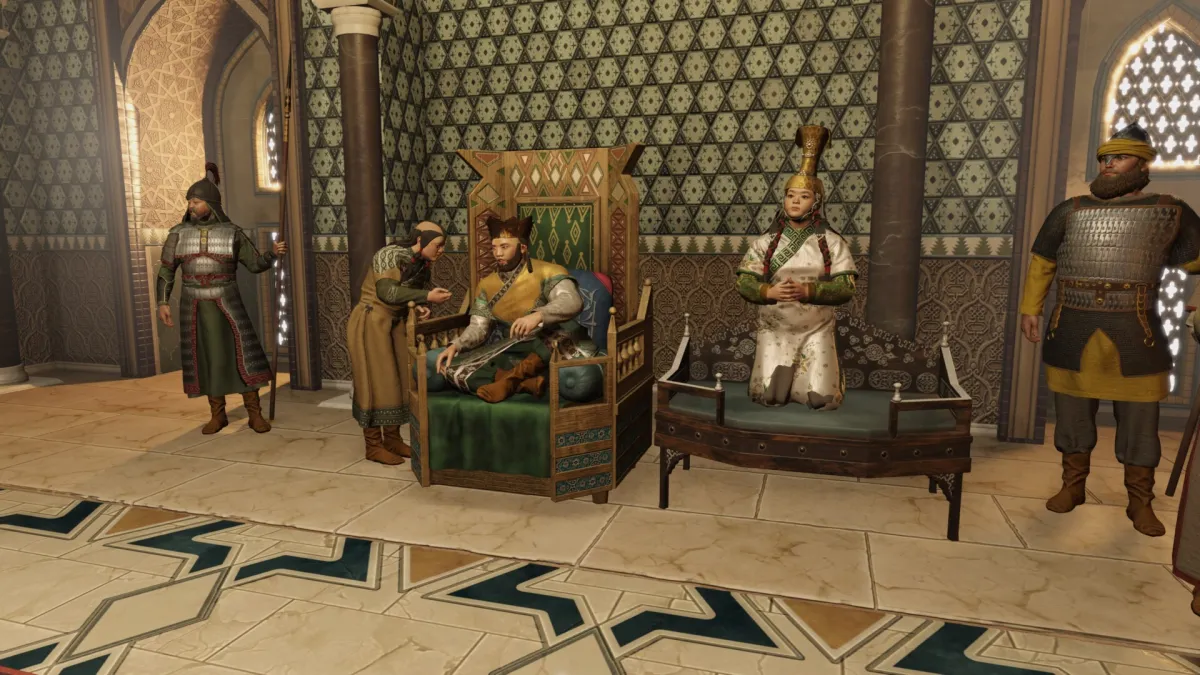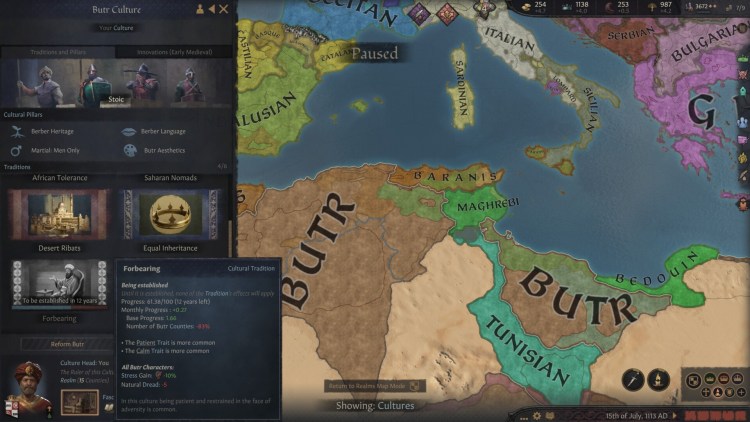Crusader Kings III: Royal Court allows you to reform, diverge, and create hybrid cultures. By changing your Ethos and other pillars of your identity as a people, you’ll have a system that’s even more dynamic. Here’s our Crusader Kings III: Royal Court cultures guide to help you with your Ethos, Cultural Traditions, and other key facets such as reformation and hybridization.
Note: For more information, check out our Crusader Kings III guides and features hub as well as our beginner’s guide/the things to do before you unpause.
Crusader Kings III: Royal Court cultures guide – Cultural Traditions, Ethos, Reforms, Divergence, and more
Cultural Pillars in Crusader Kings III: Royal Court
First, let’s talk about the Cultural Pillars in Crusader Kings III: Royal Court. These settings are present by default whenever you start your campaign as an existing/historical character:
- Heritage – The group of cultures that your people are part of, which will affect cultural acceptance (more in this mechanic in our section on hybrid cultures). Anyway, here are some examples:
- West Slavic has Polish, Polabian, Pomeranian, Czech, and Slovien.
- Iberian has Castilian, Basque, Aragonese, Asturleonese, Galician, Catalan, and Andalusian.
- Indo-Aryan has Marathi, Malvi, Oriya, Gujarati, Punjabi, Bengali, Kashmiri, Nepali, Kannauji, Rajasthani, Sindhi, Kamrupi, and Sinhala. Meanwhile, the rest of the Indian subcontinent has the Dravidian heritage, encompassing the Kannada, Telugu, Gond, and Tamil cultures.
- Martial – Determines whether males, females, or both could become military commanders and knights. This is also related to succession, which I’ll discuss later in our section on cultural traditions.
- Language – Increases the cultural acceptance with others who also speak the same language. This may also be the type of language spoken at court, and it can be learned through schemes or events.
- Aesthetics – There are the designs, uniforms, naming conventions, and other trappings related to a culture.
Ethos in Crusader Kings III: Royal Court
The Ethos of a culture in Crusader Kings III: Royal Court represents its core values and guiding principles. They tend to give specific bonuses. Likewise, they can affect the costs of acquiring new Cultural Traditions, as well as the types of courts that you can select. Although all characters/lands that belong to a particular culture gain the benefits, only the current cultural head can replace the Ethos by way of Reformation (more on this later). Here’s the gist:
| Ethos | Unlocked Court Types | Ethos Effects |
| Bellicose | Warlike Intrigue | Base Effect: +50% available mercenary companies Characters: +2 prowess; -10% men-at-arms recruitment cost and maintenance Holdings: +10% levy size |
| Bureaucratic | Warlike Administrative | Characters: +5% monthly lifestyle XP; +15% cultural fascination progress Counties: +15% development growth |
| Communal | Administrative Intrigue | Characters: -15% same culture mercenary hire cost; +5 family opinion Holdings: -10% building construction time and cost |
| Courtly | Diplomatic Scholarly | Characters: +10% prestige; -15% title creation cost; +5 house opinion; +5 court grandeur bonus |
| Egalitarian | N/A – I couldn’t find a kingdom/empire owner with an Egalitarian Ethos. My guess is that this is Diplomatic and Intrigue. | Base Effect: +35% cultural acceptance gain Characters: +10 vassal limit; +5 different culture/different faith opinion |
| Spiritual | Administrative Scholarly | Characters: +10% monthly piety; +15% control growth; -20% faith creation and reformation cost |
| Stoic | Diplomatic Warlike | Characters: +small boost to disease resistance (health); -15% stress gain; -15% friendly fatal casualties Holdings: +5 defender advantage |
Divergence vs. Reformation vs. Hybridization
There are three mechanics that add more dynamism to cultures in Crusader Kings III: Royal Court. Here’s the gist:
- Diverge Culture – Can be done by any ruler if they meet the prestige requirements. They create an offshoot branch of the culture, selecting from a pool of unlocked traditions therein. It’s like creating a Cadet Branch since they’re still part of the parent cultural group.
- Reform Culture – This can only be done by the cultural head. This allows that character to change the Ethos and replace/add new Cultural Traditions by spending a lot of prestige and waiting for decades.
- Create Hybrid Culture – Similar to Reformation, this can only be done by the cultural head. It requires a lot of prestige, as well as controlled lands that belong to another cultural group. These lands will form the basis of Cultural Acceptance.
Note: You can see these options if you open the culture button next to your character’s portrait. Alternatively, switch to the cultures map mode to see what other nations have at the time.
Reforming a Culture and Cultural Traditions in Crusader Kings III: Royal Court
Most cultures in Crusader Kings III: Royal Court will have two or more Cultural Traditions unlocked. If you’re the head of your people, you can decide to reform it by spending prestige. You can also decide to change the Ethos and Cultural Traditions. Here are some notable examples:
- Realm: Equal Inheritance – Allows you to enact the Equal Gender law (i.e., Cognatic). Likewise, you’d be able to have female fighters in your army.
- Realm: Matriarchal – Available to those with female-dominated faiths, or those in Sub-Saharan Africa (i.e., Akan, Niger Delta, Guinean Uplander, and Senegambian). You can enact the Female Preference and Female Only gender laws.
- Realm: Staunch Traditionalists – The gist is that this will greatly increase the requirement needed to create a Hybrid Culture. I found out the hard way when I did a playthrough as the King of Poland, not realizing that the Polish culture had this tradition by default.
- Realm: Culture Blending – -75% Hybrid Culture creation cost; +25% Cultural Acceptance gain; increased number of Learn Language schemes and their power.
Note: The number of counties in your realm that are part of a certain culture will also slow down the reformation process. It’ll also take a while longer if you’re attempting to replace an existing tradition as opposed to just adding a new one.
- Warfare – Many of the options here provide you with new means of boosting your armed forces. For instance, Warriors by Merit removes most restrictions on who can join up as a knight. Meanwhile, Warrior Priests add prowess to characters who have religious traits (i.e., Monk, Theologian, or Astute Intellectual), while allowing members of the clergy to serve as commanders.
- Social – Many of these have a lot to do with domestic traits, trade, construction, duels, and other social interactions.
- Ritual – Many of these are related to faiths/piety gains and marriage.
- Regional – These are dependent on the part of the world that you reside in. For example, the Iberians have Visigothic Codes, allowing for both the Equal Gender and High Partition laws. Meanwhile, Dravidians and Indo-Aryans can get Lords of the Elephant, making elephant cavalry more devastating.
Creating a Hybrid Culture and Cultural Acceptance in Crusader Kings III: Royal Court
Last but not least, let’s talk about creating a Hybrid Culture and managing Cultural Acceptance in Crusader Kings III: Royal Court. To do this, you’ll need to be the head of your culture, and rule a realm that encompasses the lands of foreigners — those that belong to the same heritage won’t count. For instance, leaders of Poland can create Prusso-Polish or Polish-Lithuanian hybrids, but not Czechoslova-krakowians (because Czechs are part of the West Slavic heritage group and because that’s a silly hybrid name).
I digress. So, let’s say you already have those lands, the next step is to ensure that you hit the required Cultural Acceptance value. You should see this value at the top of the panel if you have a foreign culture selected.
This is further affected by:
- The bonus from the Egalitarian Ethos – This was mentioned earlier.
- Culture Blending vs. Staunch Traditionalists – This was also cited above.
- Having your Steward perform Promote Cultural Acceptance on a foreign county (not Promote Culture because that lowers it).
- Giving lands to a random noble once you conquer lands – If you own castles in those domains, select them and click “Grant To…” Then, pick “A Noble of the X Culture” option to add a small bonus. This will not work if you give lands to a character in your court even if they’re of that culture.
Let’s say you already have the prestige and you’ve got those requirements done. You should then choose the Cultural Pillars (i.e., Ethos, Heritage, and the like), as well as the Cultural Traditions and aesthetics.
The selection pool will have everything that has been unlocked by your main culture and the one that you’re targeting. This gives you new customizations, such as traditions that you might not have obtained beforehand. In the case of Poland, you can get Sacred Groves and Forest Wardens from the people of the Baltic States, as you normally won’t have access to these. Don’t forget to select attires/uniforms, naming conventions, and others.
Crusader Kings III: Royal Court is available via Steam. For more information, check out our guides and features hub.













Published: Feb 8, 2022 4:40 PM UTC